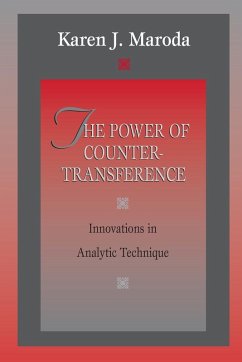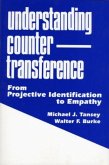A signpost of the relational turn in contemporary psychoanalysis, Karen Maroda's The Power of Countertransference, published in 1991, is perhaps the first systematic effort to integrate the need for mutual emotional exchanges, which may include the analyst's own self-disclosures, into an interactive model of psychoanalytic practice. Maroda's call for emotional honesty and affective self-disclosure had an immediate impact on the field and led Harold Searles to comment, "If we follow the example set by Maroda, we shall be minimally likely to 'act in' our emotions in our sessions with our patients. They will benefit greatly as a result; we practitioners shall benefit; and the profession of psychoanalysis and psychoanalytic therapy will become healthier and stronger than it is at present." This revised edition includes a new Foreword by Lewis Aron and an Afterword in which Maroda clarifies her own position and comments on the evolution of psychoanalytic technique since the publication of The Power of Countertransference.
"The Power of Counter-transference: Innovations in Analytic Technique teaches readers, both students and experienced clinicians, how to lead a, hopefully, successful psychotherapy session. Dr Maroda guides her readers through challenges, sharing her experiences and referencing experiences of others. She explains with great detail what kind of feelings the therapist might feel, what he or she should share with the patient, and what the therapy sessions should feel like. She explains how counter-transference would work, how to incorporate it into therapy sessions, and what the issues or consequences of it might be. Through her experiences, Dr Maroda is able to reveal the fine details of what she views as a successful therapy."
-Nataliya Rubinchik, Hunter College, International Journal of Psychotherapy
"We join [Maroda] on her own personal odyssey. Through rich and self-disclosing clinical material, she chronicles her development from a constrained novice who hid behind 'neutrality' into a world of intimate relating with her patients. We hear about her clinical failures, successes, and experiments with what is for many therapists the uncharted territory of countertransference use and disclosure. . . . This book is filled with compelling clinical vignettes and solid advice to guide therapists through the deepest currents of their own growth in the context of therapeutic relating."
- Joan Glass Morgan, Contemporary Psychology
"The Power of Countertransference is a remarkable and provocative book."
- Laura Barbanel, Psychotherapy
"There may be no single person who writes more powerfully about countertransference than Karen Maroda...literally packed full of the kind of acquired wisdom that comes with years of thoughtful clinical work...a must read for all beginning therapists.It is a book not just about countertransference but about doing and being a therapist. Maroda's challenge to the typical understanding of the therapeutic relationship has import for therapists of all theoretical persuasions...The Power of Countertransference clearly illuminates the complexity of therapy and the seriousness at stake due to the reciprocal power of patient and therapist on one another...this book may just remind you why you became a therapist in the first place."
- Brad D. Strawn, Journal of Psychology and Theology
-Nataliya Rubinchik, Hunter College, International Journal of Psychotherapy
"We join [Maroda] on her own personal odyssey. Through rich and self-disclosing clinical material, she chronicles her development from a constrained novice who hid behind 'neutrality' into a world of intimate relating with her patients. We hear about her clinical failures, successes, and experiments with what is for many therapists the uncharted territory of countertransference use and disclosure. . . . This book is filled with compelling clinical vignettes and solid advice to guide therapists through the deepest currents of their own growth in the context of therapeutic relating."
- Joan Glass Morgan, Contemporary Psychology
"The Power of Countertransference is a remarkable and provocative book."
- Laura Barbanel, Psychotherapy
"There may be no single person who writes more powerfully about countertransference than Karen Maroda...literally packed full of the kind of acquired wisdom that comes with years of thoughtful clinical work...a must read for all beginning therapists.It is a book not just about countertransference but about doing and being a therapist. Maroda's challenge to the typical understanding of the therapeutic relationship has import for therapists of all theoretical persuasions...The Power of Countertransference clearly illuminates the complexity of therapy and the seriousness at stake due to the reciprocal power of patient and therapist on one another...this book may just remind you why you became a therapist in the first place."
- Brad D. Strawn, Journal of Psychology and Theology









